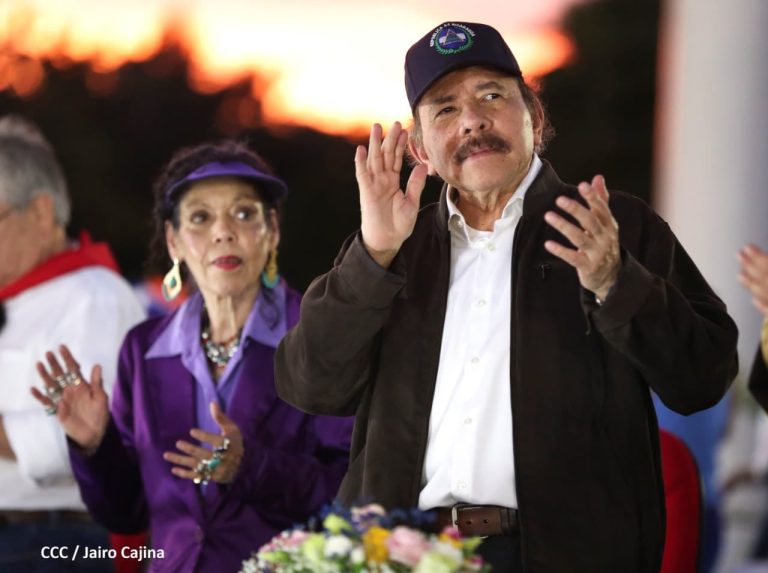21 de julio 2021

Children of Exile: The Births “Sowing Hope” in the Camp of Nicaraguan Farmers

PUBLICIDAD 1M
PUBLICIDAD 4D
PUBLICIDAD 5D
The perpetual continuation of Ortega in power represents the essence of the authoritarian tendency within the Latin American left.

Daniel Ortega waves a Nicaraguan flag. On the left is Rosario Murillo, his wife, vice president, and government spokesperson. Photo from government website “El 19 digital”
Nicaraguan president Daniel Ortega once again headed the official act commemorating 42 years since the triumph of the Sandinista Revolution. As could be expected, the ruler seized the occasion to justify his government’s repressive acts in recent months. These have resulted in diverse forms of imprisonment for 26 civic and political leaders, six of them possible presidential candidates.
In his message on July 19th, the day of the Sandinista anniversary, Ortega reiterated the main theme of the repression: the dissenters are in jail for attempting to undermine the sovereignty of Nicaragua through money laundering, terrorism, dependence on foreign funding and complicity with the US sanctions.
Ortega’s entire discourse was based on the premise of the Revolution’s eternity, with that process embodied in himself. The Revolution, he declared, “continues upright, firm, and moving forward”, through its defense against internal and external enemies. In other words, forty years later, the Revolution is repression.
Traditionally, Ortega’s definition of “internal and external enemies” is mostly aimed at the United States. However, in practice, those condemning his regime include a large part of the international community, who disapprove of the imprisonment of the opposition. Important journalistic and diplomatic sectors of the Latin American left – notably in Mexico, Argentina, Uruguay and Chile – haven’t stood aloof from that condemnation.
The only full and unconditional support for Ortega can be found in some of the governments of the Bolivarian alliance, such as Cuba, Venezuela and, to a lesser extent, Bolivia. Luis Arce, Bolivian president, was one of the few leaders from the region to personally congratulate Ortega, endorsing the myth of Sandinista continuity: “We congratulate our fellow president Daniel Ortega for these 42 years of dignity and struggle.”
However, in contrast to Cuba or Venezuela, Bolivia’s support for Ortega doesn’t stem from full geopolitical identification with the new forms of authoritarianism. The Arce government manages its international relations with greater flexibility and doesn’t seem committed to advancing towards a regime that invalidates the right to opposition and alternation in power, like in Cuba or Venezuela.
Signing on to the myth of Sandinista continuity in Nicaragua is, in any case, much more than a gesture of diplomatic support. For the last 62 years in Cuba, and the last 22 in Venezuela, there hasn’t been a political current outside of Fidelism or Chavism. But in Nicaragua, between 1990 and 2007, there were leaders and parties governing that didn’t identify at all with Sandinista thought or with Ortega.
The continuity of the Ortega rule is a fabrication that distorts history and hijacks the pluralistic legacy of the 1979 Revolution. Crediting that fiction means, in essence, contributing to the perpetuation of one person and one family at the head of government, and helping consolidate the most purely authoritarian tendency within the Latin American left.
This article was originally published in Spanish in Confidencial and translated by Havana Times
Archivado como:
PUBLICIDAD 3M
Historiador y ensayista cubano, residente en México. Es licenciado en Filosofía y doctor en Historia. Profesor e investigador del Centro de Investigación y Docencia Económicas (CIDE) de la Ciudad de México y profesor visitante en las universidades de Princeton, Yale, Columbia y Austin. Es autor de más de veinte libros sobre América Latina, México y Cuba.
PUBLICIDAD 3D